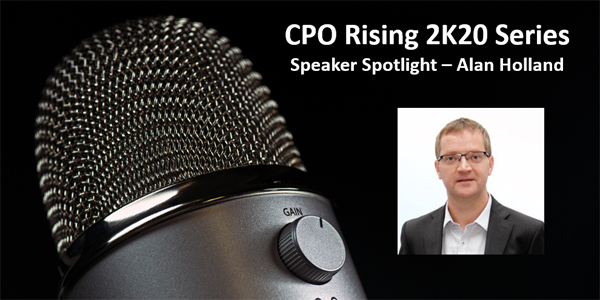In April and May, Ardent Partners hosted The CPO Rising 2K20 Virtual Series – The Resiliency Imperative as a way to bring together our global community of procurement, finance, and supply management professionals and collectively tackle the big issues we were all facing and continue to face as a result of the coronavirus pandemic. More than 2,300 people participated in the 20 virtual sessions including our livestream summit. We also had 27 experts share their ideas and insights. Once the dust settled on the series, Andrew went back to interview many of these leaders so we could learn a little bit more about them and their companies. We’re also working on a plan to replay many of the sessions, so stay tuned.
Andrew spoke with Alan Holland, Founder and CEO at Keelvar. Included below is the transcript from their discussion.
Andrew Bartolini: Alan, thanks for your time today and for your engaging session during our CPO Rising 2K20 Virtual Series on agile sourcing. Do you think we could start with an intro on your background for us today?
Alan Holland: I’m a former academic and I used to lecture in Artificial Intelligence (“AI”) in University College Cork. But, perhaps even more relevant to founding Keelvar, I was brought up in an entrepreneurial family. My parents formed a small chemical company, called Acorn Water, and the reason I became interested in advanced sourcing was to help customers of Acorn Water to buy their chemicals in a smarter way that allowed smaller suppliers play to their strengths.
AB: An entrepreneur with sourcing in his blood – nice! I guess that leads us into my next question. Would you go into a little more detail on how you ended up starting Keelvar?
AH: When I was a PhD student in the computer science department I saw that my parents company desperately needed their customers to become smarter buyers. So I started working on algorithms to solve winner determination challenges in sourcing optimization settings. Years later, companies used to seek assistance in running other large sourcing projects and I saw a need for a more user-friendly advanced sourcing optimization solution.
AB: What were the major influences in your professional career?
AH: AI researchers in UC Cork, Carnegie Mellon University, Harvard University, and Michigan inspired my academic research at the intersection between economics and computer sciences. Some of that research from 7-12 years ago is actually only coming into industrial practice now with Keelvar’s sourcing bots. It’s been a long road but many things needed to be built in advance before we could ultimately realize the vision of intelligent systems for sourcing. The company name is actually Keelvar Systems, meaning sensible or intelligent system in Gaelic.
AB: Despite my roots (half Irish), I definitely need to brush up on my Gaelic. Recent events have taught us many things regarding short-term preparation and general planning, what should companies in your space be paying attention to now, in the short-term, and in the future?
AH: Always be expecting black swan events; you never know which kind of black swan will hit next but we all know the list of major disruptors that can hit infrequently. Effective risk management is having insurance for the events that are individually very unlikely but when they hit can be catastrophic. Most people don’t think of constraining awards in sourcing events to hedge against such risks as buying insurance. But, if you always ensure dual supplies of key supplies despite the second supplier costing more, you are effectively buying insurance. It also buys goodwill and sustains longer term competition. So applying sourcing optimization to split awards is something that all companies should be doing routinely. Unfortunately, too many companies don’t understand that you need sourcing optimization to do this adequately and quickly.
AB: I think that is right. In the drive for synergies and savings, limiting supply diversification as a trade for greater discounts has been a goal of most sourcing teams. I expect more teams to go the other way on this in the 2020s. Speaking of decades, where do you think the industry will be in at the start of the next one?
AH: Expect the unexpected. We know that climate disasters will hit many locations but too many people think its somebody else’s problem. Companies will need to have more robust supply chains and fallback options so they need to increase and diversify supply bases. Where will procurement technology be in 2030: it will be a smaller number of more technologically advanced vendors that embraced AI. Simpler tools for manual operation of processes will cease to exist. I hope we’ll see procurement focused primarily on relationship management, innovation management, and risk management with purely strategic tasks and complete automation of non-strategic tasks.
AB: During the shutdown, what was the best or most interesting thing you watched (movie or show), read (book, article) or saw (something online)? If nothing comes to mind, feel free to answer, what is favorite movie or book and why you like it?
AH: Normal People was a show first released in Ireland and the UK (shot in Ireland). It now available for streaming in the US and is a must watch. It’s a coming of age drama based on a novel by Sally Rooney unlike no other and received rave reviews here in Ireland.
AB: Go raibh maith agat (Gaelic for “thank you”).
RELATED RESEARCH:
Ardent’s “2K20 Series” – Speaker Spotlight: Greg Tennyson, VSP Global
Ardent’s “2K20 Series” – Speaker Spotlight: Dan Reeve, Esker
The Intersection of Data and Sourcing
How Source-to-Settle Solutions Manage (and Leverage) Big Data – eSourcing

